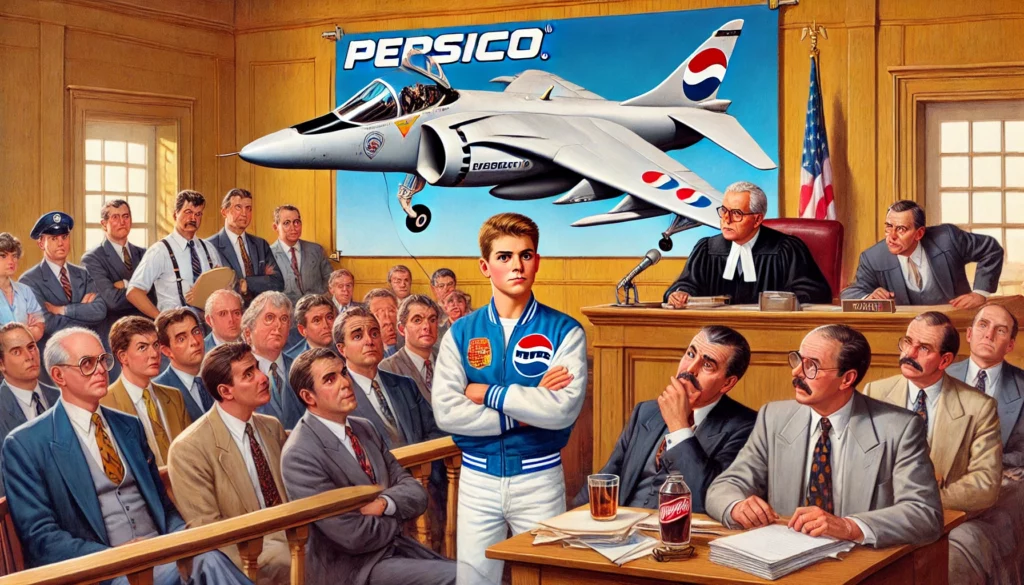In 1996, PepsiCo launched a bold advertising campaign designed to entice customers to buy more of their soda. The promotion offered customers the chance to collect points and exchange them for cool prizes like T-shirts, jackets, and jeans. The slogan? “Drink Pepsi, Get Stuff.”

But the marketing team decided to spice things up with a dash of humor. They added a particularly outrageous reward to the list: a fully functional AV-8B Harrier Jump Jet, available for the low, low price of 7,000,000 Pepsi Points.
Surely, no one would take this seriously, right? After all, how could anyone drink that much Pepsi? Even the marketing team probably chuckled at the absurdity of it all, assuming it was an impossible feat.
Enter John Leonard.
The Man Who Wanted a Jet
John Leonard, a 21-year-old college student, saw the ad and zeroed in on one thing: the Harrier Jet. Forget the T-shirts and jackets; he wanted the ultimate prize.
After studying the rules, John discovered a loophole. According to the fine print, customers could purchase additional points for 10 cents each. Doing some quick math, John realized that the Harrier could be his for just $700,000.
So, he got to work. Instead of drowning himself in millions of cans of Pepsi, John secured financial backing from investors, wrote a check for $700,000, and sent it off to PepsiCo, requesting his shiny new fighter jet.
PepsiCo’s Response: No Jet for You
PepsiCo’s reaction? A polite but firm “No.” They returned the check and explained that the jet wasn’t actually in the prize catalog and that the ad was clearly a joke.
But John wasn’t laughing. He sued PepsiCo for breach of contract, claiming that their advertisement constituted a legitimate offer and that he had fulfilled the terms to claim his reward.
The Courtroom Drama
The case went to court in 1998, and the legal showdown was as entertaining as the ad itself. Leonard argued that the commercial was a clear and binding offer. PepsiCo, on the other hand, countered that no reasonable person could believe they were seriously offering a $23 million military jet for the price of some soda and pocket change.
The court sided with PepsiCo, ruling that:
1. The ad was obviously a joke. No sane person would think a Harrier Jet could be part of a soda promotion.
2. The transaction didn’t meet the legal requirements of a contract, as there was no written agreement between the parties.
3. The value of the jet meant the deal fell under the Statute of Frauds, which requires large transactions to be in writing to prevent fraud.
Appeals and the Final Verdict
Leonard wasn’t ready to give up and appealed the decision. However, the Court of Appeals upheld the ruling, agreeing that the original judgment was sound.
Meanwhile, the U.S. government chimed in, pointing out that even if PepsiCo had been willing to hand over a Harrier Jet, they wouldn’t have been able to sell it without first “demilitarizing” it. This process would involve stripping the jet of its vertical takeoff and landing capabilities—basically, the features that make it cool in the first place.
PepsiCo’s Next Move
After the legal fiasco, PepsiCo quietly updated their ad. In the revised version, the Harrier Jet’s price skyrocketed from 7,000,000 to 700,000,000 Pepsi Points—making it abundantly clear that no amount of soda would ever get you a fighter jet.
The Legacy of the Harrier Case
The “Pepsi Harrier Jet” case has since become a legendary example of what happens when marketing humor meets legal reality. It’s a reminder to advertisers everywhere: if you’re going to make a joke, make sure your audience gets the punchline—or you might just end up in court.
As for John Leonard, he didn’t get his jet, but he did secure a place in legal and marketing history. And really, isn’t that almost as good?
0 Comments